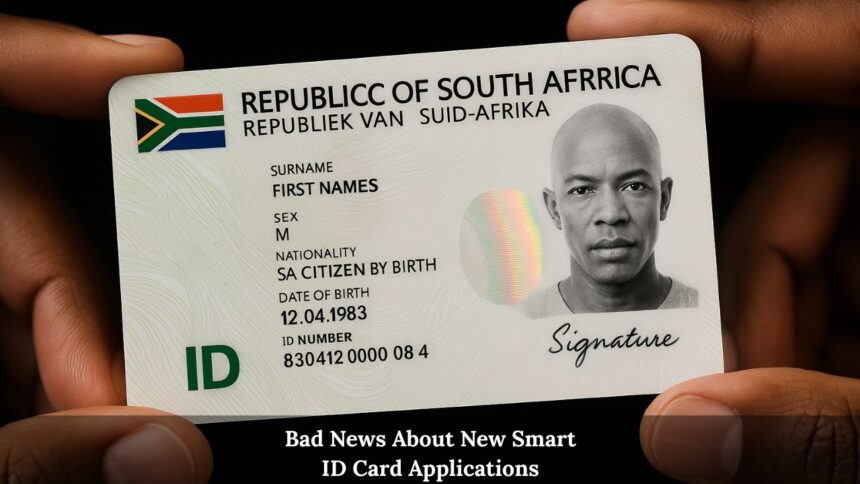Bad News About New Smart ID Card Applications. The rollout of the smart ID card system for permanent residents and naturalised citizens in South Africa has not gone as smoothly as many had hoped. Despite the recent announcement from the Department of Home Affairs (DHA) that applications would be open from 12 May 2025, multiple applicants have reported frustrating delays, technical errors, and system inconsistencies when attempting to apply.
A Long-Awaited Opportunity, Marred by Technical Issues
Until recently, more than 1.4 million permanent residents and naturalised citizens in the country were excluded from applying for a smart ID card due to outdated IT systems. Home Affairs Minister Leon Schreiber acknowledged these issues and stated that the previous lack of support stemmed from system limitations.
After technical challenges were resolved, the DHA adopted a phased approach to ease these individuals into the system. However, this plan appears to have created new confusion and delays, especially for people born in visa-exempt countries, nations that South Africa allows entry without a visa, including most of Europe, parts of Africa, Australia, New Zealand, and the United States.
Phase 1: Limited Eligibility and Confusion
Under Phase 1, the DHA is currently only accepting smart ID card applications from permanent residents and naturalised citizens born in one of the 106 visa-free countries. Furthermore, this phase focuses specifically on replacing green barcoded ID books, not on issuing IDs to first-time applicants.
Applicants must use either:
- A Home Affairs branch equipped with Live Capture systems, or
- A bank branch linked to eHomeAffairs services.
Every applicant is first verified against the National Population Register at the Meeter-Greeter station. The verification process checks the authenticity of the green ID book and confirms the country of birth for permanent residents. Those who don’t meet the eligibility in this phase may be considered later under Phase 2.
Applicants Facing System Glitches and Miscommunication
Despite qualifying under the outlined rules, many permanent residents and naturalised citizens have reported technical errors when applying online through eHomeAffairs. Some users received system messages such as:
“No ID application can be captured — Applicant is a Permanent Resident.”
Others shared accounts of being turned away at DHA branches, where officials allegedly claimed that the system was not fully operational despite the minister’s announcement.
According to one frustrated applicant, a DHA official simply smiled when asked when the system would be working and offered no estimated timeframe.
Additional Documents Creating More Barriers
Several forum users and applicants have reported new document requirements that were not clearly communicated. These include:
- A naturalisation certificate for naturalised citizens
- A permanent residence permit for permanent residents
Without these, applicants must:
| Situation | Required Action |
|---|---|
| No permanent residence permit | Fill out and submit a BI-829 form for a duplicate |
| No naturalisation certificate | Apply for a duplicate before continuing the smart ID process |
Applicants who previously never needed such documentation to replace or apply for an ID book are now caught in an unexpected bureaucratic web. Many have expressed concerns about missing or lost certificates, especially those naturalised decades ago.
eHomeAffairs Limitations and Long Booking Waits
Another issue relates to limited appointment slots at bank branches that offer DHA services. These banks can only process smart ID cards and passports for applicants who already have the required documents. Those missing documentation are forced to use regular Home Affairs branches.
However, even applicants who meet all criteria find themselves struggling to book appointments due to a shortage of slots. Some banks report being fully booked weeks in advance, and others have very few time slots left. This has led to rising frustration, with many applicants mistakenly blaming the banks, when in fact, eHomeAffairs controls the slot allocation and scheduling.
As of now, only around 30 bank branches nationwide support the smart ID card application process, and more than half of them are located in Gauteng. Alarmingly, two provinces still have no bank-based DHA services at all.
Conclusion
While the effort to extend smart ID card services to all eligible South Africans is commendable, the current implementation has clearly left many people in limbo. Permanent residents and naturalised citizens, especially those from visa-free countries, are eager to receive their modern IDs but are now facing digital hurdles, document confusion, and booking delays.
For the Department of Home Affairs, it is critical to address these issues promptly. Improving communication, expanding booking slots, and resolving system bugs will be key to restoring trust and efficiency in this much-needed update to South Africa’s identity management system.










